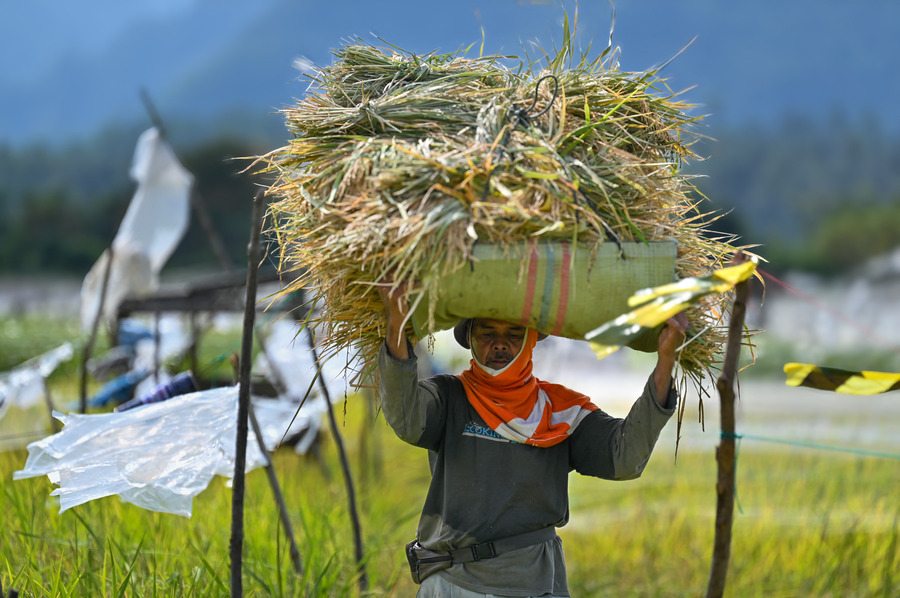Indonesia Refuses Rice Export Request Amid Global Supply Concerns
By Archyde News service
JAKARTA, Indonesia — Indonesia has declined a request from Malaysia to import rice, signaling growing concerns over global food security and domestic supply. Agriculture Minister Andi Amran Sulaiman announced the decision, emphasizing that Indonesia needs to prioritize its own reserves. “it was captivating, [Malaysia] asked earlier whether [they] could import rice from indonesia,” he said during a press conference in Jakarta.
The decision highlights the increasing pressure on rice-producing nations as climate change and geopolitical instability impact agricultural output worldwide. Sulaiman, after a meeting with Malaysian Agriculture and Food security Minister Mohamad Bin Sabu, stated, “I said, temporarily, we will maintain the [domestic] stocks. We will assess the climate [conditions first].”
Domestic Reserves Prioritized
Indonesia’s move to safeguard its rice reserves reflects a cautious approach to food management. The government’s rice reserve stocks (CBP) at the state Logistics Agency (Bulog) currently stand at 3.3 million tonnes, with plans to increase this to 4 million tonnes by May. This buffer is seen as crucial for ensuring price stability and food availability for Indonesia’s large population.
Malaysia, facing its own supply challenges, had hoped to supplement its domestic production with imports from Indonesia. Amran noted that Malaysia can onyl meet “around 40 to 50 percent of national demand.” Mohamad Bin Sabu acknowledged the situation, stating that, “Not yet, but we will discuss,” regarding a formal import directive. He also expressed Malaysia’s interest in collaborating with Indonesia to enhance its own rice production through agricultural technology exchange and training.
Global Rice Market Under Strain
The situation in southeast Asia mirrors a broader global trend of rising rice prices and supply uncertainties. Japan, another major rice consumer, is also experiencing notable price increases. Amran mentioned that rice prices in Japan have soared to between Rp 93,000 (US$5.52) and Rp 100,000 per kilogram.”
Reports indicate that rice prices in Japan have risen for 15 consecutive weeks, despite government interventions to stabilize the market by releasing stockpiled supplies. Japan’s agriculture ministry reported that “the average price for 5 kilograms of rice had reached 4,217 yen ($29.72) from April 7 to 13…the highest as tracking began in March 2022, and up 2,139 yen from the same period last year.” These figures underscore the severity of the situation in East Asia.
Indonesian Production Outlook
Despite the global pressures, Indonesia’s domestic rice production is projected to increase. Based on Statistics Indonesia’s (BPS) February Area Sample Framework Survey (KSA), total rice production in the January-May period is estimated to reach 34.47 million tonnes of unhusked rice (GKP).
Khudori, an agriculture expert with the Indonesian Political Economy Association (AEPI), noted that this amounts to around 16.62 million tonnes of rice for public consumption produced in the same period. This marks an increase of 1.83 million tonnes, or 12.4 percent, from the same period last year. Though,last year’s annual rice production for public food consumption amounted to around 30.62 million tonnes, a 1.54 percent drop compared with 2023 production of 31.1 million tonnes,according to the BPS,highlighting the volatility of agricultural output.
Implications for the United States
While the immediate impact of Indonesia’s decision is felt most acutely in Southeast Asia,the ripple effects could extend to the United States. As a major exporter of agricultural products, the U.S. closely monitors global food supply trends.Reduced rice availability in Asia could lead to increased demand for U.S. rice exports, potentially driving up prices for American consumers as well.
Moreover, the situation underscores the importance of investing in agricultural research and technology to enhance crop yields and resilience in the face of climate change. The U.S. Department of Agriculture (USDA) is actively involved in research aimed at developing drought-resistant and high-yielding rice varieties.
The USDA’s Economic Research Service (ERS) projects that global rice production will remain vulnerable to weather-related disruptions in the coming years. This highlights the need for proactive measures to mitigate risks and ensure food security.
Counterargument: Prioritizing national Interests vs. Regional Cooperation
While Indonesia’s decision to prioritize its domestic rice reserves may seem prudent from a national outlook, it raises questions about regional cooperation and solidarity. Some argue that in times of crisis, neighboring countries should support each other to ensure food security across the region. By refusing Malaysia’s request, Indonesia risks undermining trust and cooperation within the Association of Southeast Asian Nations (ASEAN).
Though,proponents of Indonesia’s decision contend that a stable domestic rice supply is essential for maintaining social and political stability. They argue that Indonesia has a primary duty to its own citizens and cannot afford to jeopardize its food security by exporting scarce resources.
Looking Ahead
Indonesia is scheduled to host representatives from Japan’s Ministry of Agriculture, Forestry and Fisheries on april 29 to discuss rice supplies. This meeting underscores the growing international concern over rice availability and the need for collaborative solutions.The U.S. will likely be watching these developments closely, as they could have implications for its own agricultural trade and food security policies.
FAQ: Global Rice Supply and Prices
- Why are rice prices rising globally?
- Several factors are contributing to rising rice prices, including climate change impacts on crop yields, geopolitical instability disrupting supply chains, and increased demand from growing populations.
- What is Indonesia’s role in the global rice market?
- Indonesia is a major rice producer and consumer. Its decisions regarding rice exports can substantially impact global rice availability and prices.
- How does climate change affect rice production?
- Climate change can lead to droughts, floods, and other extreme weather events that damage rice crops and reduce yields. Rising sea levels also threaten rice-growing areas in coastal regions.
- What is the U.S. doing to address global food security?
- The U.S. invests in agricultural research, promotes sustainable farming practices, and provides food assistance to countries in need. The USDA also monitors global food supply trends and works to mitigate risks.
- What can consumers do to cope with rising rice prices?
- Consumers can explore alternative grains, reduce food waste, and support policies that promote sustainable agriculture and food security.







